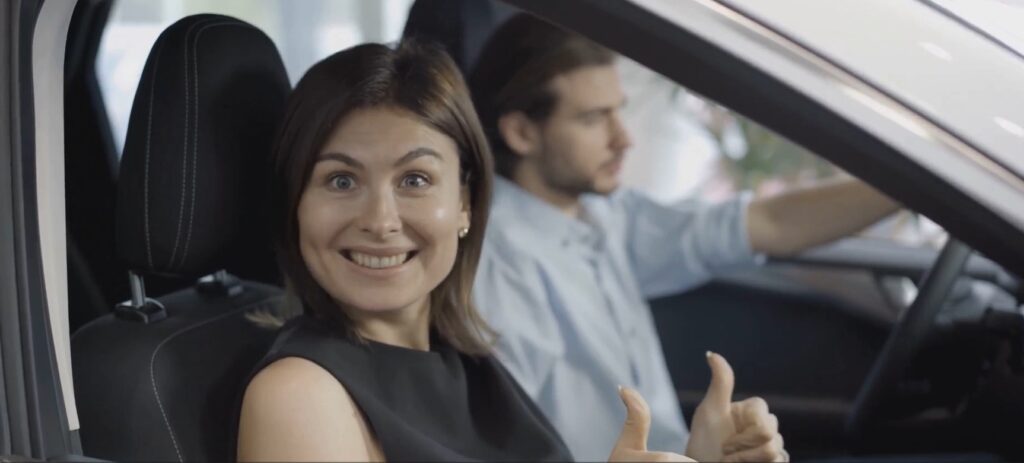(…) how well you can drive(?) Can you prove that you’re a good driver? Iseult Gillespie shares tips on how to best tackle the challenges of driving and build confidence.
Complete the gaps in the video excerpt with the words in bold below:
lane braking reckless anticipate honking
halts look away horn rage distracted
As one of the agency’s best employees, you’ve been selected as a finalist to potentially take on a new top-secret mission. You’ve already shown your aptitude for surveillance and disguise, but the agency’s looking to test one last critical skill – how well you can drive. To prove yourself, you’ll need to complete a series of complicated challenges behind the wheel.
As the test begins, you notice that the distances between yourself and the cars around you are being meticulously monitored. One of the most widely recommended strategies when it comes to safe driving is known as defensive driving. It doesn’t mean driving paranoid, but rather making a conscious effort to 1 …………. potential errors and accidents.
For example, keeping a three-second distance from the car in front of you increases your chances of stopping in time if traffic suddenly 2. ………. . You soon approach your first obstacle – a sudden 3. …………. closure. While many assume that good driving etiquette requires them to merge as soon as possible, most safety studies suggest the opposite.
Continuing at a consistent speed until you reach the lane endpoint and then zipper merging decreases the number of potentially dangerous lane switches. And this doesn’t just improve safety – it also keeps traffic moving. One study found that using signs that encourage drivers to zipper merge can reduce traffic backup lengths by 40%.
Your phone lights up. It’s the agency. Should you pick it up? While it might seem easy to multitask while you drive, most people can’t balance driving with anything else effectively.
It’s estimated that 80% of accidents happen when the drivers 4. …………. from the road. And just because your hands are on the wheel doesn’t mean you’re not 5. ………….. . In one study, drivers who were talking on the phone hands-free had delayed 6. …………. reactions and made as many mistakes as drivers who were intoxicated.
And those who think they’re the exception to the rule might be most at risk. People who self-identify as multitasking pros tend to perform worst at tests that require dividing their attention. Suddenly a car cuts you off and your hand instinctively moves towards the 7. ……… .
You’re not alone. Up to a third of drivers report that they’ve acted aggressively on the road, 8. …………. or shouting at another driver. Road 9. ……….. is thought to be sparked by the perception of other drivers as 10. ………… , rude, or even deliberately trying to impede you. (…)
Now watch the whole video and check your answers.
Key: 1. anticipate; 2. halts; 3. lane; 4. look away; 5. distracted; 6. braking; 7. horn; 8. honking; 9. rage; 10. reckless
Glossary
- aptitude – a natural ability or talent for something
- meticulously – in a very careful and detailed way; showing great attention to small details
- to impede – to slow down or block progress; to make something more difficult to do
- to exacerbate – to make a problem, situation, or feeling worse
- to retaliate – to take revenge; to do something harmful in response to being harmed or attacked
- feat – an impressive or difficult achievement
Practice makes perfect
Read the article and decide if the sentences below are true or false?
https://www.scientificamerican.com/article/how-to-be-a-better-driver/
1. Meditation can train your brain to stay focused while driving.
2. Using a hands-free phone while driving is much safer than using a handheld one.
3. Passengers in the car can actually help a driver stay aware of road conditions.
4. Experienced drivers know better where to direct their attention.
5. Yoga might improve vision and concentration skills helpful for driving.
6. According to Atchley, most drivers are paying full attention on the road.
Key: 1T; 2F; 3T; 4T; 5T; 6F
Discuss
- In the video, defensive driving is emphasized. How do you personally stay alert and anticipate the actions of other drivers?
- Both the video and article mention that even hands-free phone use can distract drivers. Have you ever tried multitasking while driving? What happened?
- The video talks about road rage being exacerbated by stress, anonymity, or rushing. What strategies could help reduce aggressive driving behaviors?
- The video highlights that mistakes are a valuable part of learning. Can you think of a personal experience where a driving mistake helped you improve your skills?
- Do you think driving skills can truly improve mental agility and focus in other areas of life? Give examples.
Watch and Revise!
5 Signs You’re a Pro Driver!
https://www.cloud.worldwideschool.pl/index.php/s/H6PYNyGqm7ra55A
(6566)






